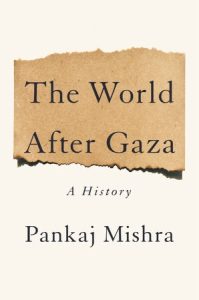Penguin Press
Review by Brian Tanguay

Pankaj Mishra is a writer of capacious erudition which he has demonstrated in eight books of non-fiction, two works of fiction, and dozens of articles in the world’s most prestigious journals of thought and opinion. In The World After Gaza he situates the polarizing conflict in the Middle East in historical perspective, between the West’s triumphal narrative of victory over fascism and communism, and the ongoing struggle of the world’s darker peoples’ to realize a post-colonial vision of civil and human rights. Nothing that has happened in recent years, Mishra writes, compares to Gaza, and “nothing has yielded so much shameful evidence of our lack of passion and indignation, narrowness of outlook and feebleness of thought.”
Mishra traces the way our understanding of the Holocaust came into being, and then became a universal and enduring justification for Israel’s actions in the Middle East. Noting how the term Holocaust didn’t enter into ordinary English usage until the early 1960s, Mishra recalls the Nuremberg trials, where in one instance it took a French prosecutor more than an hour to even mention the Nazi effort to exterminate European Jewry. The world has largely forgotten the other atrocities of the war, including the extermination of Slav populations, Gypsies, disabled people and homosexuals.
Germany has made public remembrance of its past a foundation of its collective identity, and yet for many months, German leaders steadfastly resisted European calls for a ceasefire in Gaza. In tracing Germany’s zigzag journey from antisemitism to philosemitism, Mishra reminds us that Jewish displaced persons were languishing in West German camps as late as 1952. But to be fair, Germany’s response to Jewish refugees wasn’t unique. Neither Britain or the United States opened their doors to Jewish refugees during or immediately after World War II. Tens of thousands of Jews were held in Cyprus by the British, and the US didn’t modify its immigration barriers until 1953 when it accepted 80,000 refugees. So what happened to so fundamentally change perceptions in Germany, Britain, and the United States? How did the Jews go from being unwanted to deserving of every protection the West could offer, including, over time, policies that silenced any criticism of Israel? Why is there a Holocaust museum in Washington D.C.? Is it, as James Baldwin once posited, a guilty response, an attempt to atone for how little the United States did while the Holocaust was happening?
From the 1958 novel Exodus to the 1994 film Schindler’s List, Mishra demonstrates how the West, and particularly the US, came to over-identify with Israel, a gradual process that has fatally distorted US domestic and foreign policy. “There are many more dangers to democratic freedoms,” writes Mishra, “in the deepening links between Israeli governments, pro-Israel Jewish outfits and white supremacists in the United States and Europe.” This is most visible in how assiduously these groups cling to the old fantasies of cultural purification and ethnic-racial unity.
The Holocaust narrative that has been so useful to Israel may be losing its potency to provide Israel with unlimited moral legitimacy. Is the world moving, Mishra asks, into a period when the Holocaust might be replaced as the preeminent symbol of human and moral evil? Despite prodigious efforts to keep its memory alive, the Holocaust is a fading reference point, while Gaza is live-streamed to the world in real time and in all its grisly horror. “It is Gaza that has quickened their understanding of a decrepit world,” Mishra observes, “which no longer has any belief in itself, and which, concerned merely with self-preservation, tramples freely on the rights and principles it once held sacred, repudiates all sense of dignity and honour, and rewards violence, lies, cruelty and servility.”
Whether or not the world has enough moral and political imagination to liberate itself from Manichaean historical narratives is an open question. While the leaders of the richest and most powerful nations haven’t acted with the necessary vision or courage, the same cannot be said of young people around the world, who, even in the face of condemnation by their powerful elders, have demonstrated their willingness to break with the past no matter the personal cost. Taking risks on behalf of freedom, human dignity, and peace has always required uncommon moral courage.
